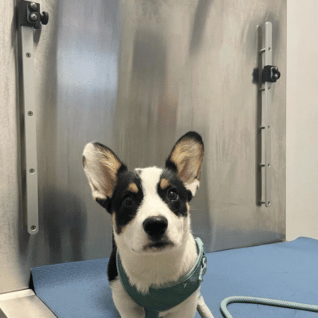At All Ears Veterinary, we are committed to excellent pet parent communication. We always encourage our clients to contact us with any questions we have, so that our trained nurses or doctors can assist you. We are also always happy to refer clients to reputable, well-researched resources where they can read more about a topic (A lot of great answers can be found on Dog Spotted). To see what other dog parents are asking, here are the top 10 most common questions for vets we get.

Questions For Vets: Top 10 most common questions

@sullivanmulligan
Why do puppies need multiple vaccinations?
Most vaccines require multiple doses to be effective. Oral or intranasal Bordetella (Kennel Cough) and Rabies vaccines are two exceptions which are effective after a single dose.
Most common vaccines such as Lyme, Influenza, and Leptospirosis require two doses because the immune system response after the first dose is relatively weak. A second dose 2-4 weeks later will boost a pet’s immunity and provide much longer protection.
The DA2PP (Distemper, Adenovirus-2, Parvovirus, and Parainfluenza) vaccine provides protection against four illnesses. Unlike other vaccines, the first dose is started at 6-8 weeks old and must be boostered every 2-4 weeks until at least 16 weeks of age. This is done because puppies receive antibodies from their mothers (maternal antibodies) which supplement their weak immune system. These antibodies usually start to wear off around 6-8 weeks of age, which is when we start their vaccines. Though the antibody levels are declining, they are still present and interfere with the puppy’s immune system “remembering” the vaccine for more than a few weeks. That is why we keep boosting the vaccine until the antibodies are fully gone at 4 months of age.
How do I get my puppy to stop biting me?
It is normal for puppies to bite while playing? Puppies learn to play gently by interacting with their littermates. When a puppy bites too hard, the other puppy will withdraw. This teaches the naughty puppy that hurting something means they don’t get to play anymore. This is one reason why it’s important for puppies to stay with their mother and littermates until at least 8 weeks of age.
You should try to mimic this behavior when a puppy bites you. First, simply walk away and ignore your pet. Do not bop them on the head or shout – they will interpret this as further playing. If that does not work, try to direct them to chew on a safe toy instead. Working with a trainer at puppy classes is always recommended.

@heart.in.the.hills

@kikicockapoo
What age should pets be spayed or neutered?
We generally recommend spaying and neutering puppies at 5-6 months of age. At a younger age, puppies may have a harder time regulating body heat and blood sugar under anesthesia. Spaying after the first heat cycle (usually 6 – 10 months of age) is linked with a higher incidence of breast cancer.
There is a lot of research going on about breed-specific age guidelines. There is a fairly well-documented link between neutering large-breed dogs at a young age and an increased risk of joint disease later in life. For this reason, we generally recommend neutering large breed dogs after 1 year of age.
It is always best to ask your veterinarian the best age for your specific pet, as other factors such as temperament may alter our recommendations.
What vitamins and supplements do pets need?
Well-balanced dog food does not generally require additional supplements for a healthy dog. A good dog food should say something to the effect of “This food is formulated to meet the nutritional levels established by the AAFCO Food Nutrient Profiles,” or “Animal feeding tests procedures substantiate that this diet provides complete and balanced nutrition.” It is important that puppies feed a food solely designed for puppies, not for all life stages.
This website gives information on how foods are approved for pets.
There are many common supplements that veterinarians recommend for various conditions. In general, these are safe to offer pets with the following issues. However, it is always ideal to ask your veterinarian before starting a new supplement.
- Young and underweight dogs can benefit from a calorie supplement such as Nutrical
- Omega Fatty Acid supplements can help with itchiness and dandruff
- Glucosamine / Chondroitin supplements as well as undenatured type-II collagen supplements can help with joint issues
- Calming supplements such as Composure Pro and Zylkene can help with anxiety

@dovethefrenchie

@letsgonix
When should puppy training classes start?
Dogs have a socialization window when they are most receptive to training and learning behavioral cues from other dogs. This window is generally between 3 and 12 weeks of age. This is why it is important to start training and socializing puppies as early as possible.
While training and socialization classes carry a small risk of transferring diseases among puppies, most facilities require that puppies be healthy, have initial vaccines, and have a negative fecal test. Because of this, we generally recommend that training classes be pursued at 8 weeks of age or as soon afterwards as possible.
How do I tell when it might be time to put my pet to sleep?
Putting a beloved pet to sleep is one of the hardest things to do. Euthanasia, or facilitating a peaceful death, is often necessary at some point for pets with chronic illnesses. The most important thing to consider before euthanizing a pet is if they are in pain or distress. If a pet has chronic or severe problems breathing or is constantly in significant pain, euthanasia is likely warranted.
It can be more difficult to assess general quality of life. In general, independence and following their typical routine are good indicators of a fulfilling existence. If pets need significant help to eat, drink, or move, that is a poor sign. It is also worrisome when a pet no longer does a majority of the things that they used to enjoy, whether that be playing, lounging with their pet parents, going on walks, or whatever other activities they normally pursue.
This survey from Ohio State University can be used to assess your pet’s quality of life.

unsplash.com

unsplash.com
How do I stop my dog from eating its own poop?
Eating feces, or coprophagia, can be a tough habit to break. Some dogs do this for medical or behavioral reasons. Many dogs, however, do not have an underlying reason for this behavior. Ways to prevent this include:
- Cleaning feces from areas your dog commonly visits
- Consider giving your pet supplements such as CoproBan which change the flavor of their poop. Be aware that this will not prevent your pet from eating other animals’ feces.
- Place a basket muzzle on your pet when outdoors so they cannot eat things on the ground.
- Reward your pet when feces are nearby and not eaten.
- If all else fails, consider a noxious but unharmful stimulus when feces are eaten. Examples are spraying a pet with water or using a dog whistle. Be aware that this may exacerbate stress and worsen a behavioral condition, which is why positive reinforcement as listed above is always tried first.
An excellent summary of Coporphagia can be found here.
How do I take care of my pet’s teeth?
Dental disease is one of the most common illnesses that veterinarians diagnose. Small breed dogs are particularly susceptible, though most dogs will develop at least mild dental disease throughout their lifetime. You can imagine that if you didn’t brush your teeth for 10 years they would have issues!
We recommend a multimodal approach to dental health. This includes includes the following:
- Brushing the teeth as often as possible (up to twice daily) with a dog toothbrush and toothpaste
- Adding special additives such as HealthyMouth to the water to reduce oral bacteria
- Offering daily dental treats such as Greenies or Oravet
- Feeding mostly dry food, which sticks less to the teeth
The Veterinary Oral Health Council (VOHC) has a comprehensive list of approved dental products.

@oskithebosti

@sabbydare
Do pets really take the same medication as people?
Many medications that we prescribe are the same ones that people take. Some examples include antihistamines (Benadryl), Antacids (Prilosec), Pain Medications (Gabapentin), and Antibiotics (Metronidazole). For some of these drugs, the dosages are similar to what humans take. Others have very different dosages.
There are also some drugs we take that are very harmful for pets. For example, people often take non-steroidal anti-inflammatory drugs (NSAIDs) such as Ibuprofen for pain. However, ibuprofen has a high chance of upsetting dogs’ stomachs and causing kidney issues. For this reason, there are dog-specific NSAIDs such as Carprofen instead. This is why it is very important to never give your pet any medication without checking with your veterinarian.
Should I bring my pet in for vomiting or diarrhea?
As dogs investigate things with their mouth and tend to have less dietary discretion than people, it is very common for them to ingest strange things that cause mild and temporary gastrointestinal issues. Many cases of vomiting, diarrhea, decreased appetite, and lethargy can be resolved with a bland diet such as boiled chicken and rice. However, these signs are vague and can also be seen with more serious health conditions. If you are at all unsure whether or not your pet needs to be seen, it is always best to err on the side of caution and call your veterinarian. Listed below are some indicators that you should take your pet to a veterinarian.
- Knowledge that your pet recently ingested a foreign body (bones, toys, rocks, or other non-food substance)
- Blood in either the vomit or feces
- Obvious pain
- Vomiting or having diarrhea more than two times in a 24-hour period
- The abdomen appearing bloated or distended
- More than 24 hours elapsing without improvement
- Your pet not responding to you speaking to them or touching them

unsplash.com




Conversation